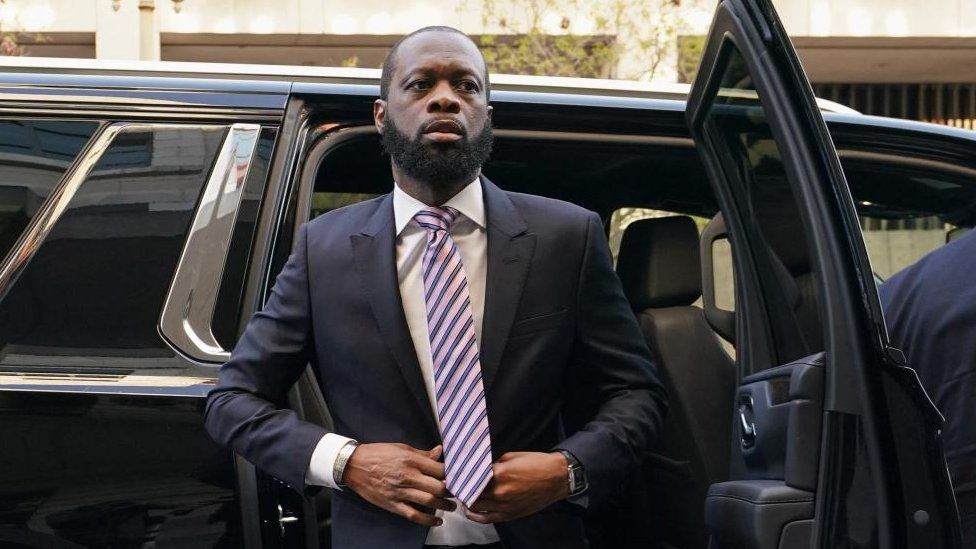ARTICLE AD BOX
 Image source, Reuters
Image source, Reuters
Prakazrel "Pras" Michel arriving at the DC court on Thursday
By Bernd Debusmann Jr
BBC News at the United States District Court for DC
Prosecutors claim that ex-Fugees rapper Prakazrel "Pras" Michel took $100m (£81.4m) from a fugitive tycoon to generate favour with top US officials.
Mr Michel, 50, is accused of taking the money from notorious Malaysian businessman Jho Low to carry out a "clandestine" influence campaign.
He now faces a slew of charges including conspiracy and witness tampering,
The Grammy winner has denied any wilful wrongdoing.
The ex-musician, best known for his work on the Fugees' best-selling 1996 album, is accused of bringing "secret, illegal foreign influence to bear" during the administrations of Barack Obama and Donald Trump between 2012 and 2017.
According to US authorities, Mr Michel received over $100m (£80.8m) from Jho Low, the 41-year-old Malaysian businessman accused of stealing approximately $4bn from his country's sovereign wealth fund during the 1MDB scandal, widely considered the world's biggest financial crime.
Prosecutors believe that Mr Low hoped to use Mr Michel to help lobby officials in the administration of former President Donald Trump to abandon an investigation into Mr Low's role in the 1MDB scheme.
Mr Michel is also accused of taking money to help convince US government officials to allow the extradition of a vocal US-based dissident, Guo Wengui, back to China.
For this, he stands accused of failing to register as a foreign agent - a crime under US law.
Additionally, Mr Michel stands accused of making illegal contributions to Mr Obama's 2012 US presidential campaign, using an illegal network of third parties paid with foreign funds.
Mr Michel faces more than 20 years behind bars if convicted of the charges.
The sprawling case could see Hollywood celebrities such as Leonardo DiCaprio testify, alongside prominent former US government officials such as Steve Bannon and Rudy Giuliani.
During an opening statement on Monday, prosecutor Nicole Lockhart told jurors that the case largely focuses on the role of "foreign money, foreign influence".
She told the court Mr Michel "profited exorbitantly" from Mr Low's efforts to secure "back-channel influence" among the upper echelons of the US government.
"The defendant wanted money and was willing to break any laws necessary to get paid," Ms Lockhart said.
Mr Low, who is a co-defendant in the case, is currently a fugitive and is believed to be in China.
During her remarks, Ms Lockhart said Mr Michel "was looking for other ways to be paid" after his music career fizzled following the Fugees' enormous success in the 1990s.
She claimed that Mr Michel "saw an opportunity to make money" through Mr Low, whose initial desire to "get close to the rich and famous" morphed into an effort to avoid the consequences of the 1MDB scheme.
"Low was in trouble and needed help," Ms Lockhart said. "He had lawyers, and that wasn't working. He needed a different type of help".
At one point, US authorities believe that Mr Michel and others, including Republican lobbyist Elliott Broidy, attempted to arrange a golf outing between Malaysia's President and Mr Trump to discuss the 1MDB case.
Broidy, who pleaded guilty in 2020, was pardoned by Mr Trump before he left the White House.
During Ms Lockhart's statement, Mr Michel, clad in a dark suit and pink and blue tie, repeatedly glanced at jurors and members of the public in attendance, occasionally speaking with members of his legal team.
Mr Michel's attorney, David Kenner, opted to not deliver his own opening argument on Thursday. Instead, he will do so after the government rests its case. In court documents, Mr Kenner has argued that Mr Michel believed he was acting in US interests and was not operating as a foreign agent.
Prosecutors, however, have claimed that Mr Michel knowingly broke the law and went to great efforts to cover-up the scheme, including by reaching out to potential witnesses using "burner phones" that couldn't be tracked and threatening to sue them if they worked with investigators.
The trial, which continues at the United States District Court for the District of Columbia, is expected to be last about a month.

 2 years ago
47
2 years ago
47








 English (US) ·
English (US) ·